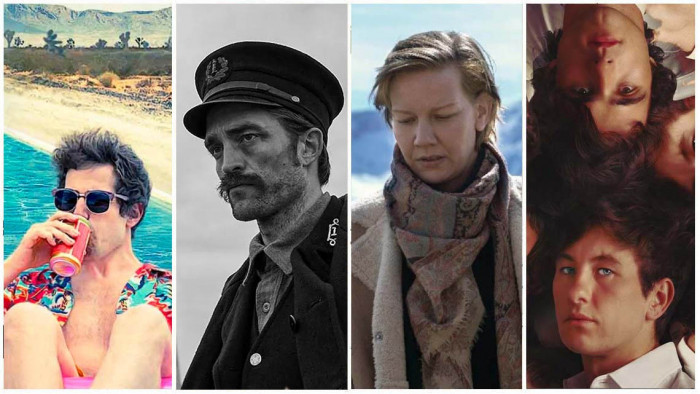'Reservoir Dogs': the legacy of Tarantino's first and best film, 25 years on
Sorry, but it's better than Pulp Fiction and you're wrong if you think otherwise


Jerry Seinfeld isn’t the most obvious place to start when unpicking the many inspirations behind Quentin Tarantino’s film-making career. Masters of the big screen like Sergio Leone, Jean-Luc Godard and Jean-Pierre Melville are more likely to be cited as the formative forces on Tarantino and his blistering debut, Reservoir Dogs, which turned 25 years old in 2017. It should be looked back on as one of the most momentous films of the modern era, but for all its smartly movie-literate exploits in storytelling, it’s the characters’ distinctly Seinfeldian obsession with life’s banalities that is perhaps its most radical innovation.
Take away the glorious levels of profanity, and Reservoir Dogs’ opening scene - in which schlubby, unremarkable men sit around dissecting Madonna lyrics and squabbling over tipping etiquette in a diner - could be lifted straight from the sitcom. If Jerry, George and co. were assigned a high-risk diamond heist, you could expect them to bicker obstinately over their designated code names as Tarantino’s hardened criminals did in the autumn of ‘92.
Seinfeld had already proven that this fixation on life’s petty details was comedy gold; Tarantino showed it could be Hollywood gold too, not least as the foil for a story of dead-eyed underworld brutality. His grinning juxtaposition of the monstrous and the mundane – each element somehow heightening the other – was a stroke of genius, exhilarating audiences who had understood the dark thriller and the light comedy to be wholly separate concepts. Two years later, his jewel thieves’ deconstruction of ‘Like a Virgin’ morphed into the deliberations about the metric system and foot massages that so preoccupied Pulp Fiction’s mobsters, and, for better or worse, a genre was born.

A quarter-century on, the films spawned by the Tarantino blueprint – splintered plot, explosive violence and a generous peppering of pop-culture chit-chat – have almost been too many to count. They take in the full range of worth, from bona fide masterpieces like Amores Perros, to forgotten gems like The Way of the Gun, to the entire oeuvre of Guy Ritchie. It’s hard to argue that ’Tarantinoesque’ isn’t worth its place in the Collins Dictionary.
While Pulp Fiction is the film generally regarded as Tarantino’s magnum opus, the simple truth is that Reservoir Dogs is - by some distance - the better movie, and from the vantage point of 2017, it makes for an especially intriguing case study. It’s a great irony of Tarantino’s career that the director who made his name as a video-store man-child actually got off the mark with his most grown-up film and worked backwards from there. This Benjamin Button trajectory can be traced from the no-frills ferocity of Reservoir Dogs, through to the notably goofier Pulp Fiction, past the cut-and-paste homage-fest that is Kill Bill, and all the way to the three-hour sessions of shock-jock self-indulgence that are Django Unchained and The Hateful Eight.
As Tarantino’s budgets, ego and level of creative freedom have been allowed to run wild, the low-key theatrical intensity of his debut has become a distant memory. Back then, though, making his movie on a shoestring forced him to make it a taut as one, too, and at 99 minutes, Reservoir Dogs is a masterfully controlled exercise in pressure-cooker tension. And yet despite its brevity, the film finds plenty of time for high-end innovation. While Pulp Fiction’s interlocking, loop-the-loop narrative may well have been the cinematic game-changer, there’s a case to be made that Reservoir Dogs’ structure, while less tricksy, is no less inspired.

First off, the heist-movie-without-a-heist conceit is as smart as it is brave, transforming what should be a high-octane caper into a pared-back chamber piece where all the action, flashbacks aside, happens within the suffocating confines of a disused warehouse. As nonlinear storylines go, the back-and-forth dynamic is more straightforward, for want of a better word, than Pulp Fiction’s numerous entangled threads, but again it serves a simple, shrewd function: we get to watch the job’s build-up and fall-out play out side by side. The tentative comfort with which the new acquaintances shoot the breeze makes for especially fun viewing when pitched against their future selves’ descent into distrustful hysteria
The film’s most enterprising bit of storytelling, though, is a far more literal one: a scene where, in order to win over his new buddies, Tim Roth’s undercover cop rehearses, tells and eventually lives out a story about his fictitious criminal past. What’s most notable is that the anecdote itself is essentially a non-story, centring on a confrontation that never happens. Instead, it’s the process of the telling that draws us in – will he be able to deliver it convincingly? – with our eventual transportation into the made-up scene itself serving as ingenious vindication of his ability to do exactly that. It’s a nice analogy for the film as a whole, too: a work of fiction that casts us under its foul-mouthed spell despite the pivotal event being conspicuous in its absence.
Although the story of Tarantino’s career is the story of his steady loss of restraint, born out in ever-more cartoonish ultraviolence and buried under an avalanche of niche movie references, Reservoir Dogs couldn’t be more self-disciplined if it tried. Granted, his favourite word gets a brief airing, but otherwise the juvenile impulses that have blighted and bloated his later work are all nowhere to be seen.
If the mark of a great movie is how it stands the test of time, then a quarter of a century on Reservoir Dogs still audibly crackles with that sense of unencumbered exuberance that characterised American cinema in the decade or so until 9/11. It’s possible that it even looks better now than it did then, its legions of fast-forgotten imitators having mainly served to impart the lesson learned by our doomed thieves: that pulling off a job of such effortless efficiency is nowhere near as easy as it looks.
(All images: REX Features/Miramax Films)
Latest
Related Reviews and Shortlists


The 10 best war movies of the 21st century








